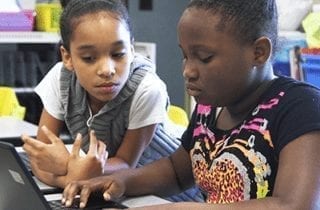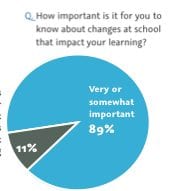While the Wild West era of edtech may be over, there’s still some mystery over how schools decide what digital materials to buy. Similarly, researchers and developers have their own approaches to the sales process. In the edWebinar, “Building Authentic Need and Research into Edtech Development,” representatives from a large school district, a small district, a developer, and the research community answered burning questions about edtech procurement.
At first, educators could count the number of edtech programs in their school on one hand—and the number of users wasn’t too much more. Later, schools used spreadsheets and written reports to determine usage, and developers had to wait months, possibly years to get and analyze efficacy data. Now, when usage data is available on a daily basis, developers and educators have a shared interest in that information. During their edWebinar, “Edtech Usage Data: Key to Planning Efficacy Research,” Dr. Denis Newman, Co-founder of Evidentally, Inc., and Kylene Shen, VP of Marketing at Evidentally, Inc., explained why usage data studies are beneficial to edtech companies and schools as well as what types of additional studies can provide relevant insights.
In this edWebinar, Michelle Luhtala and Dr. Brenda Boyer share the flipped instructional program that Dr. Boyer introduced to her virtual library students.
In this session, participants will explore alternatives to the traditional research paper that will engage students with the research process while challenging them to document their learning using innovative tools and meeting rigorous expectations.
Presented by Kevin Baird, Chairman of the Board at the nonprofit EdCenter: The Center for College & Career Readiness Sponsored by Ed Center WATCH THE WEBINAR RECORDING All students suffer learning loss when they are away from school. During the holidays, students can miss nearly one month of focused instructional time. In this research-filled webinar,… read more →
Interest in the potential of games for learning is growing, from researchers, practitioners and policy-makers, predominantly for their ability to engage students. However, Dr. Nicola Whitton, Senior Research Fellow at Manchester Metropolitan University argues that the benefits of games are greater than simply motivation.
With or without the Common Core, there is a renewed focus on inquiry in K-12 education. Students are expected to demonstrate proficiency in research skills, but they seldom have a clear understanding of how to grow their learning – how to shift from superficial, fact-finding overviews, to deep, targeted, and detailed evidence collection.
Researchers from Northwest Evaluation Association (NWEA) explored Make Assessment Matter: Students and Educators Want Tests That Support Learning, public opinion research on K-12 assessment highlighting the perceptions of students, classroom teachers and district administrators.
How is learning and teaching being transformed by digital tools? How do administrators, teachers, parents, and students really use technology right now? And what does the future of personalized learning look like?
Skilled online researchers typically have certain behavior sets, mindsets and beliefs that inform their approach to every research project. We call these Online Research Habitudes, a combination of habits and attitudes without which no researcher can succeed. Crucially, teachers must learn to model for students the habitudes of a skilled researcher.











